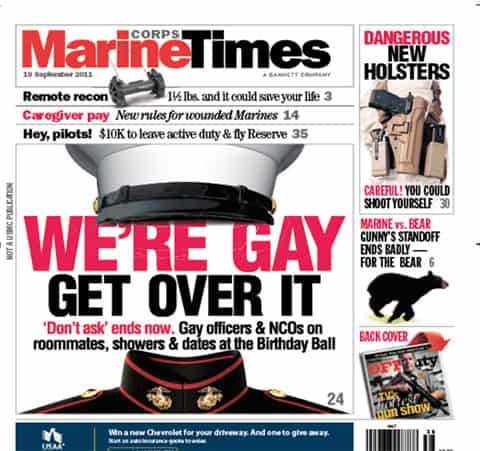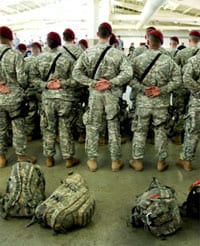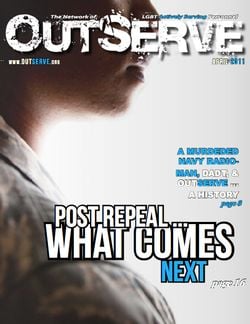
(The cover of this week's Military Times)
It's hard to believe that "Don't Ask, Don't Tell", the military's discriminatory ban on openly gay troops, is headed for the history books tomorrow, September 20th.
 The Stars and Stripes reports that it's "business as usual" on the eve of 'DADT' repeal:
The Stars and Stripes reports that it's "business as usual" on the eve of 'DADT' repeal:
Pentagon leaders and the White House on Tuesday will acknowledge the end of the 18-year-old law — the basis for the dismissal of roughly 14,000 gay servicemembers — and last year's contentious debate repealing it.
But, other than a few news conferences, no formal military events or instructions are planned. Troops have been attending training briefings on the rule changes since last spring, and no new sessions or advisories are expected after repeal….
…Service officials will enact a handful of related policy changes in coming weeks, updating regulations barring dismissal of or discrimination against gay servicemembers. Department rules bar collection of any data related to troops' sexual orientation, so new recruits won't be asked if they're gay or refused if they declare that.
Those already in the military who come out to co-workers will no longer face the possibility of dismissal, although that threat has lessened in recent months. In the last 11 months, only four servicemembers were kicked out under the rule, all at their own request.
 Outserve, the association of actively-serving LGBT military personnel, today released the findings of its latest survey. Twice as many replied to this survey as their last one:
Outserve, the association of actively-serving LGBT military personnel, today released the findings of its latest survey. Twice as many replied to this survey as their last one:
Many respondents expressed their expectation that there would be few problems with repeal, with 67% saying they expected their colleagues would treat them “universally” or “generally” without discrimination. As one wrote: “Lots of people at work know a friend of mine is gay, and there have been no negative reactions toward him. As for another friend in a combat unit, the whole unit knew he was gay and no one cared.”
Many expressed their relief at not having to lie any more, and their continuing commitment to serve their country: “We are professionals. The fact that we put our personal lives aside to put on a uniform and serve is a testament to our commitment to supporting and defending the constitution.”
“The repeal of DADT allows LGBT troops to do what their straight counterparts already take for granted – to share and talk about life events without fear of repercussion. Shared experience can only lead to a better understanding of who we are as individuals, and contribute to the same mission: protection of those we love and service to our country.”
The online survey was completed anonymously by over five hundred LGBT Army, Air Force, Navy, Marine Corps, and Coast Guard personnel during the week of September 13, 2011: one week prior to the end of DADT. Since survey respondents are self-selected, the survey is not authoritative, but is a likely indication of the current status of LGBT troops.
Read the results HERE (doc).
KEY FINDINGS
Survey responses doubled since May 2011
Responses to the OutServe Survey more than doubled since the previous survey, conducted in May 2011. The low response in May – 224 members – was attributed to fear of identifying oneself, even in a confidential survey, as LGBT. In the most recent survey, we received 533 responses.
Many are already “out,” anticipate acceptance
An overwhelming 78% indicated that they are “out” to at least some in their unit. Thirty-eight percent said they had come out to more people since the DADT law was repealed. Asked if they would take a significant other to a unit event, 30% said “definitely,” and another 29% said they “likely” would. This optimistic response is also reflected in how they expect their units will treat LGB members: two-thirds indicated they expected their colleagues would treat them “universally” or “generally” with respect, and free from discrimination.
Trust in the Chain of Command
As in the previous survey, most LGB troops reported that, if they have issues with harassment or unfair treatment, they would most prefer to go their chain of command (55%) rather than their Equal Opportunity Rep (19%), the Inspector General's office (7%), or a chaplain (3%).
Also, a very high number, 84%, found the DADT training was conducted professionally (“very professional,” “generally professional,” or “neutral”).
Over 20% in committed relationships
Given the youth of the respondents, it is unsurprising that 58% are single; however, 21% reported they are in a committed long-term relationship, either in a same-sex marriage or civil union, or “would be married if allowed by the state.”


